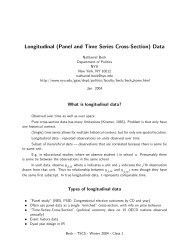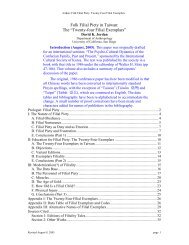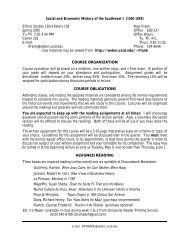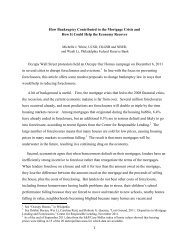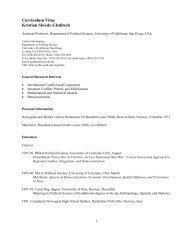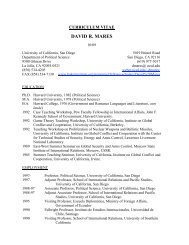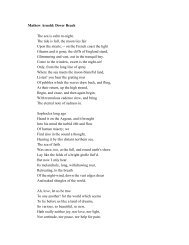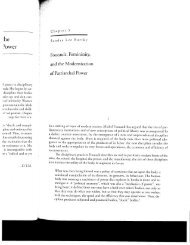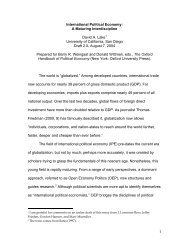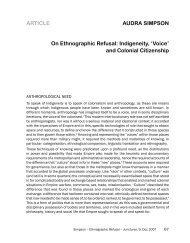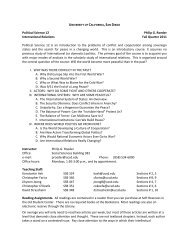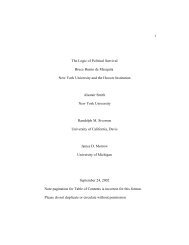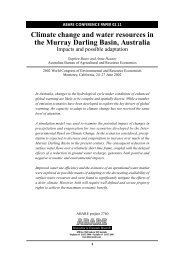Disciplines Unbound: Notes on Sociology and Ethnic Studies
Disciplines Unbound: Notes on Sociology and Ethnic Studies
Disciplines Unbound: Notes on Sociology and Ethnic Studies
Create successful ePaper yourself
Turn your PDF publications into a flip-book with our unique Google optimized e-Paper software.
512 Symposia<br />
always a gendered <strong>and</strong> racial formati<strong>on</strong>. talism. In another instance, Rosa Linda Fregoso<br />
Similarly, George Lipsitz (1994) c<strong>on</strong>tends that (1994) shows how culture functi<strong>on</strong>s as a social<br />
the rise of identity movements during the 1940s force by documenting how gendered images <strong>and</strong><br />
reflected how class came to be increasingly lived ideas in cultural products <strong>and</strong> practices serve as<br />
<strong>and</strong> experienced through race <strong>and</strong> gender. The impetus for the development of a Chicana femirecent<br />
scholarship in <strong>Ethnic</strong> <strong>Studies</strong> also calls nist politics of "differential c<strong>on</strong>sciousness." This<br />
attenti<strong>on</strong> to the ways in which new social rela- interdisciplinarity is not <strong>on</strong>ly methodological or<br />
ti<strong>on</strong>s have produced new coaliti<strong>on</strong>s <strong>and</strong> c<strong>on</strong>flicts theoretical; it is also a resp<strong>on</strong>se to the inadequathat<br />
transform the meaning of racial <strong>and</strong> ethnic cy of self-c<strong>on</strong>tained disciplines particularly the<br />
identity. For example, Lisa Lowe (1996) shows universalizing models of social analysis to<br />
how the current global restructuring particu- address the new <strong>and</strong> complex c<strong>on</strong>necti<strong>on</strong>s<br />
larly the internati<strong>on</strong>alizati<strong>on</strong> <strong>and</strong> feminizati<strong>on</strong> between culture <strong>and</strong> social structure engendered<br />
of labor forces-c<strong>on</strong>stitutes a shift in the mode by a new global c<strong>on</strong>text, new communicati<strong>on</strong>s<br />
of producti<strong>on</strong> that now necessitates alliances technologies, <strong>and</strong> new transnati<strong>on</strong>al social relabetween<br />
racialized <strong>and</strong> Third World women ti<strong>on</strong>s (Lipsitz 1997; Basch, Schiller, <strong>and</strong> Blanc<br />
within, outside, <strong>and</strong> across the border of the 1994).<br />
United states. In sum, most of the best work in The critical social knowledge produced by<br />
<strong>Ethnic</strong> <strong>Studies</strong> views ethnicity as corljurlCtural, as <strong>Ethnic</strong> <strong>Studies</strong> <strong>and</strong> related interdisciplinary<br />
a "product of intersubjectivity <strong>and</strong> interacti<strong>on</strong> in studies left the barest traces <strong>on</strong> sociology until<br />
c<strong>on</strong>crete historical <strong>and</strong> social circumstances" the 1980s. The publicati<strong>on</strong> of Michael Omi <strong>and</strong><br />
(<strong>Ethnic</strong> <strong>Studies</strong> Department 1994).<br />
Howard Winant's Racial Formatiorl irl the Urlited<br />
Perhaps most important, the most exciting States in 1986 (republished in 1994) was groundwork<br />
in <strong>Ethnic</strong> <strong>Studies</strong> is relentlessly interdisci- breaking. Emphasizing the socially c<strong>on</strong>structed<br />
plinary <strong>and</strong> multidisciplinary. Born amid the nature of race, Omi <strong>and</strong> Winant insist that race<br />
radical flux <strong>and</strong> rec<strong>on</strong>figurati<strong>on</strong>s of knowledge <strong>and</strong> racial logic are ubiquitous, determining<br />
within the academy, <strong>Ethnic</strong> <strong>Studies</strong> owes its <strong>on</strong>e's political rights, <strong>on</strong>e's locati<strong>on</strong> in the labor<br />
existence to the development of interdiscipli- market, <strong>and</strong> <strong>on</strong>e's sense of identity. Perhaps<br />
rlary trends within traditi<strong>on</strong>al disciplines, to the most important, the authors link cultural expresestablishment<br />
of new interdisciplinary studies, as si<strong>on</strong>s with social structure by defining race as "a<br />
well as to the growing dialogue across disci- matter of both social structure <strong>and</strong> cultural repplines.<br />
Drawing from the best work in the resentati<strong>on</strong>" (1994: 56). Subsequent studies of<br />
humanities <strong>and</strong> social sciences <strong>and</strong> from the bur- race in sociology have both drawn from <strong>and</strong><br />
ge<strong>on</strong>ing theoretical <strong>and</strong> methodological innova- exp<strong>and</strong>ed <strong>on</strong> Omi <strong>and</strong> Winant's influential<br />
ti<strong>on</strong>s in Feminist <strong>Studies</strong>, Queer <strong>Studies</strong>, racial formati<strong>on</strong> perspective. For example, in a<br />
Postcol<strong>on</strong>ial <strong>Studies</strong>, Cultural <strong>Studies</strong>, <strong>and</strong> study of multicultural <strong>and</strong> multiracial California<br />
Communicati<strong>on</strong> <strong>Studies</strong>, <strong>Ethnic</strong> <strong>Studies</strong> schol- during the last half of the nineteenth century,<br />
ars c<strong>on</strong>ceptualize race <strong>and</strong> ethnicity as an ele- Tomas Almaguer (1994) skillfully traces the<br />
ment of both social structure <strong>and</strong> culture. "racial formati<strong>on</strong>" of Anglos, Mexicans, Indians,<br />
Noting the mutually c<strong>on</strong>stitutive qualities of Chinese, <strong>and</strong> Japanese populati<strong>on</strong>s by denoting<br />
cultural forms <strong>and</strong> social structures, <strong>Ethnic</strong> how race is mutually determined by structural<br />
<strong>Studies</strong> scholars delineate the role of race in the <strong>and</strong> ideological factors. In her pivotal study<br />
cognitive mapping of U.S. culture, emphasize Black Femirlist Thought ( 1 99 1 ), Patricia Hill<br />
the oppositi<strong>on</strong>al cultural practices am<strong>on</strong>g Collins argues that ideological representati<strong>on</strong>s of<br />
aggrieved groups, <strong>and</strong> examine how the cultural gender <strong>and</strong> sexuality are central in exercising<br />
symbols generated by the dominant group seem <strong>and</strong> maintaining racial, patriarchal, <strong>and</strong> class<br />
to justify the ec<strong>on</strong>omic exploitati<strong>on</strong> <strong>and</strong> social dominati<strong>on</strong>. N<strong>on</strong>sociologists have also been<br />
oppressi<strong>on</strong> of racialized populati<strong>on</strong>s over time. influenced by the racial formati<strong>on</strong> perspective.<br />
In an innovative study of Asian-American For example, in an impressive study of Asianwomen<br />
as a problem of knowledge, Laura Hyun American cultural politics, literary theorist Lisa<br />
Yi Kang (1997) traces the complex c<strong>on</strong>necti<strong>on</strong>s Lowe (1996) traces the genealogy of a distinct<br />
linking the discursive producti<strong>on</strong> <strong>and</strong> circula- "racial formati<strong>on</strong>" of Asian Americans through<br />
ti<strong>on</strong> of Asian-American women as transnati<strong>on</strong>- the history of the legislati<strong>on</strong> of the Asian as<br />
al labor with the actual physical labor performed alien <strong>and</strong> the administrati<strong>on</strong> of the Asian<br />
by these women in globalized, militarized capi- American as citizen.




